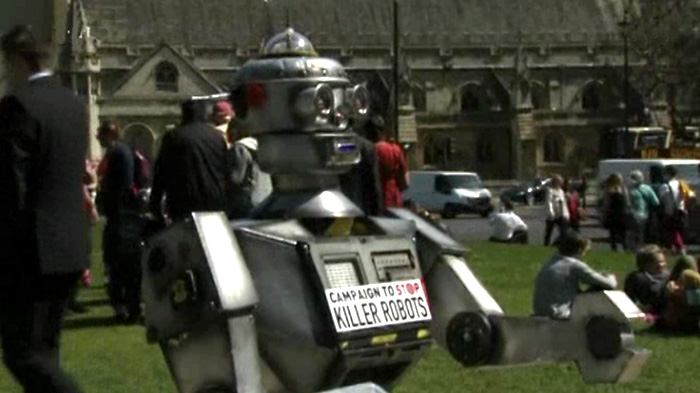From the 13th to the 17th of April around 120 states will come together during the multilateral meeting of the Convention of Conventional Weapons at the UN in Geneva to discuss fully autonomous weapons systems, so called killer robots. PAX, co-founder of the Stop Killer Robots Campaign, is confident that the meeting will form the basis for a worldwide ban on fully autonomous weapons.
“It is a good sign that there is so much attention for the issue of killer robots” says Miriam Struyk, programme director Security and Disarmament of the Dutch peace organisation PAX “Developments are going extremely fast and there are growing concerns regarding weapons without meaningful human control, so a ban needs to be achieved as soon as possible.”
The Netherlands is critical
Politicians, experts and civil society are looking into the question of what a killer robot actually is, what meaningful human control should be and what the best measures are to safeguard human control. Also they will see if there is a consensus among the many states who are a member of this UN-forum that further measures are necessary to regulate fully autonomous weapons. At the moment the Netherlands doesn’t have national policy on this issue, but has voiced its concerns related to the robotisation of warfare. A Dutch delegation, including representatives from the Ministry of Foreign Affairs and the Ministry of Defence, is also taking part in the meeting in Geneva. Miriam Struyk will share her concerns on behalf of PAX at the meeting of the convention. PAX will also bring the interfaith declaration for a ban on fully autonomous weapons under the attention. The declaration had been signed by over a hundred religious leaders and faith-based groups.
No distinction
In last years report Deadly decisions PAX described the 8 main objections against the development, production and use of fully autonomous weapons. An important objection is that there will not be any meaningful human control in an attack undertaken by a killer robot. Warfare is reduced to killing without a heart. PAX is also greatly concerned that these weapon systems will lower the threshold when it comes to using violence and to the unrestrained spread of violence. Furthermore PAX is of the opinion that a robot cannot distinguish between soldiers and civilians and cannot know if an attack is proportional regarding the number of casualties. And who can we hold accountable for an attack of a killer robot; the machine, the programmer, the producer? And what if things go wrong?
Peace less likely
A killer robot will probably be deployed more easily, as a country or group doesn’t have to sacrifice its own troops. Furthermore these weapons would probably be relatively cheap and easy to replicate. They can conduct anonymous secret mission, without third parties being able to monitor these activities. Fear among people in conflict areas will increase if these monstrous weapons would be deployed. Attacks will create hate and the desire for revenge, making the possibility for peace less likely.
No regret
By making those involved aware of these objections and by mobilizing people for action through the Stop Killer Robots Campaign, PAX wants to prevent these weapons from ever becoming a reality. Miriam Struyk: “If we take the right steps towards a ban now, we won’t have to regret that we did not intervene in time.”
Read also: Stop Killer Robots




